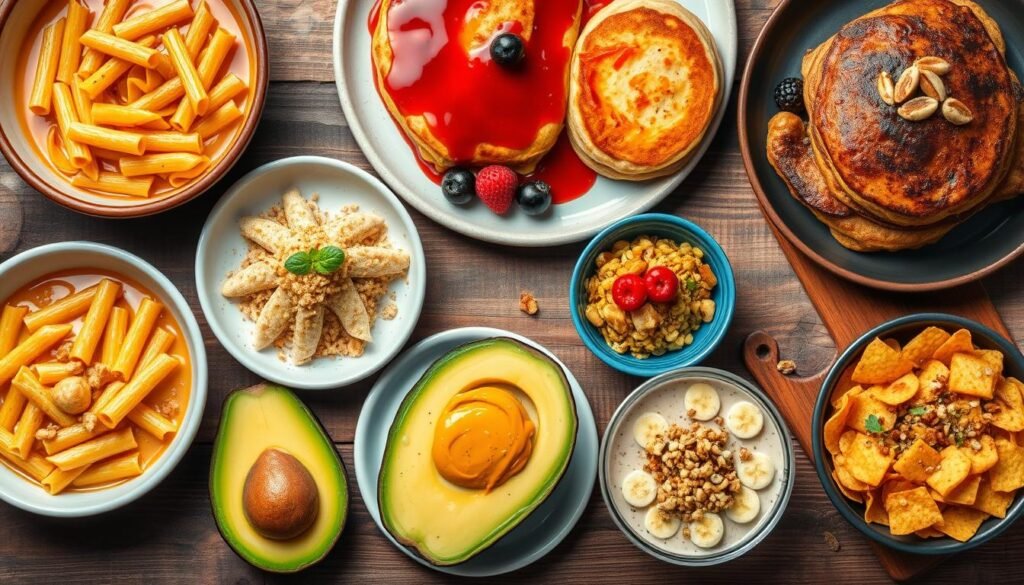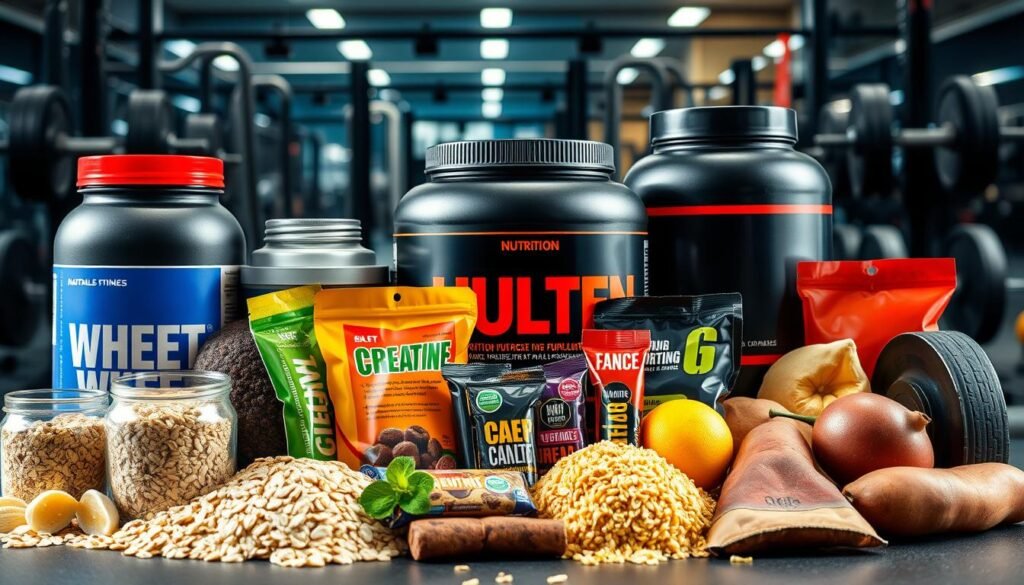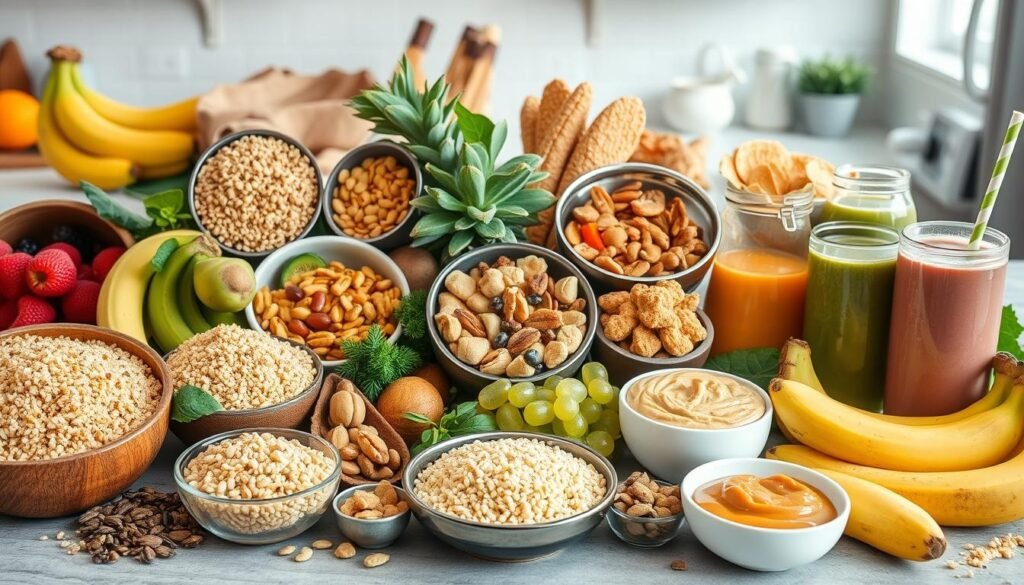To gain muscle, you need about 300–500 extra calories each day. This fact underscores how crucial high-calorie carbs are in a bulking diet. For bodybuilders and fitness fans, picking the right carbs is key to getting the muscle mass you want.
High-calorie carbs are your main fuel during heavy workouts and help with recovery. By choosing the right carbs, you can boost your performance and gain weight effectively. This article will explore various high-calorie carb sources and their benefits to help you with muscle growth.
Key Takeaways
- High-calorie carbs are essential for effective muscle mass gain.
- Including a variety of carb sources can enhance workout performance.
- Aiming for an additional 300–500 calories daily is key for weight gain.
- Proper nutrient timing within 30 minutes of workouts supports muscle growth.
- Focus on real food sources over supplements to meet caloric needs.
The Importance of High-Calorie Carbohydrates
High-calorie carbs are key for muscle building. They help get the extra calories needed for muscle growth. These carbs are the main fuel in tough workouts, refilling muscle glycogen. When bulking up, watching how much carbs you eat is key. They keep your energy up, help with recovery, and boost performance.
Carbs do more than just give instant energy. They stop you from getting tired and your muscles from wearing out. Looking at 49 studies, carbs showed different effects on performance. This was seen mostly in strength training and with athletes. When they had carbs right before, their performance often got better. This highlights the need for good carbs in a bulk-up diet to improve workouts and recovery.
Understanding bone and joint health is also key for a balanced diet. This keeps your overall health and movement in check while focusing on muscle growth. High-calorie carbs are vital for keeping up with training needs. They help athletes face tough challenges without burning out. Adding various tasty, rich in nutrients carb sources can make bulking up both fun and effective.
What is Bulking and Why is it Important?
Bulking is about eating more calories to grow muscle mass. It’s key for those wanting to get stronger. You have to plan your meals and workouts well for bulking to work.
Bodybuilders eat a lot during bulking. Men might eat 3,800 calories a day and women 3,200. This is much more than during the cutting phase. Then, they eat fewer calories to lose fat.
To bulk up right, you need to eat the right mix of foods. Carbs should make up 45–60% of what you eat. Protein should be 30–35%, and healthy fats 15–30%. This helps grow muscles.
When bulking, eat a bit more than usual. Aim for 10–20% more calories than you need. This might mean gaining 0.25–0.5% of your body weight each week.
But, it’s not just about eating more. What you eat matters. Avoid junk like alcohol and fried foods. Pick nutrient-rich foods instead.
Drinking plenty of water is also a must. Try to drink 1.5-2 liters a day. And don’t forget your vitamins and minerals. Eat various foods, including fruits and veggies, for better health and muscle gain.
Understanding Caloric Surplus for Muscle Gain
To gain muscle, you need to eat more calories than you burn. It’s vital to know how many calories you need every day. This number changes based on your age, gender, weight, and how active you are. Finding the right amount of calories stops mistakes like eating too little, which can stop muscle growth. People who want good results might follow special meal plans. These plans help you eat enough calories and nutrients.
Creating a meal plan makes it easy to eat more without trying too hard. This helps your body have enough energy for recovery and muscle building. It’s smart to eat a bit more to gain about one pound of muscle a week. You do this by eating 44 to 50 more calories per kilogram of your body weight each day.
Eating the right way is as important as eating enough. Foods high in protein help fix muscles after hard exercises. Using good protein supplements is key for fast recovery when you’re trying to gain muscle. Looking at guides on eating more calories gives more tips on how to do it right.
Sources for Fueling Your Bulk
When you’re trying to bulk up, picking the right carbs is key. Adding high-calorie foods, like whole grains and rice, helps meet energy needs and grow muscle. It’s vital to know how these foods power your bulking efforts for the best results.
Whole Grains: The Energy Powerhouse
Whole grains, like quinoa, brown rice, and oats, are packed with complex carbs and fiber. They give you steady energy, which is great for intense workouts. These grains also have lots of vitamins, minerals, and antioxidants, boosting overall health.
- Quinoa: A complete protein filled with amino acids.
- Oats: Great for heart health thanks to beta-glucans.
- Brown Rice: Offers long-term energy and is simple to make.
Rice: The Ultimate Easy Calorie Source
White rice is a favorite for bulking diets because it’s high in calories and easy to use. You can add it to many meals, making it perfect for upping your calorie intake. Rice helps athletes meet their high energy needs without eating too much.
| Type of Rice | Calories per Cup | Carbohydrates per Cup | Preparation Time |
|---|---|---|---|
| White Rice | 205 | 45g | 20 minutes |
| Brown Rice | 218 | 46g | 45 minutes |
| Wild Rice | 166 | 35g | 45 minutes |
High-Calorie Foods to Include in Your Bulking Diet
High-calorie foods are key for a successful bulking diet. They help you meet the high energy needs of muscle growth. Nuts, nut butters, and starchy vegetables are not just rich in calories. They also provide the vital nutrients needed for muscle repair and growth.
Nuts and Nut Butters: Small Packs with Big Calories
Nuts and nut butters are a must-have for anyone looking to bulk up. A little bit, like a handful of almonds, can give you a big calorie boost. They’re also loaded with healthy fats and protein. For example, a two-tablespoon serving of peanut butter has around 200 calories and eight grams of protein. It’s perfect for adding to smoothies or snacks to up your calorie intake.
Starchy Vegetables: Sweet Potatoes and More
Starchy vegetables, such as sweet potatoes, are packed with good carbs. One hundred grams of sweet potatoes have about 112 calories. They’re full of vitamins and minerals, helping you refuel after exercising. When you pair them with lean proteins, you make them even more effective for bulking. Including these types of food in your diet ensures a balanced nutritional plan that supports muscle gain.
High-Calorie Meal Ideas for Bodybuilders
Bodybuilders need meals with a lot of calories to reach their goals. It’s important to choose foods that are not only high in calories but also full of nutrients. This helps increase energy and muscle growth. Below are some great options for every meal that are both tasty and healthy.
Breakfast Options: Starting the Day Right with High Calories
Try an omelette made with egg whites and whey protein for breakfast. This meal is high in protein but low in cholesterol. Add a side of Greek yogurt with berries for more protein. These foods are great for building muscle and fit well into a bodybuilder’s diet.
Lunch Ideas: Gaining the Midday Edge
Lunch could be turkey ragù with penne pasta. It’s a dish with low carbs, perfect for the bulking phase. Add a salad with avocado and olive oil for healthy fats and calories. For another option, try flank steak with quinoa. This meal is full of iron and helps with performance.
Dinner Delights: Filling Up After a Workout
Dinner can be high-calorie pizza with shrimp or salmon for protein. Both add about 18 to 22 grams of protein per serving. Use a whole-grain crust to make it even better. This meal is ideal for refueling after a hard workout.

Best High-Calorie Snacks to Fuel Your Bulk
To grow muscle during a bulking phase, eating more calories is essential. High-calorie snacks are great for this. They help you meet your daily nutrient needs and keep your energy up. Choosing the right snacks is key to hitting those calorie goals.
Mass Gainer Shakes and Smoothies
Mass gainer shakes are a quick way to up your calories, perfect for those who are always on the go. Loaded with carbs and protein, they help muscles recover and grow. Smoothies with fruit, nut butter, and protein powder pack in calories without making you feel too full. Add Greek yogurt or oats for extra nutrition and calories.
Protein-Packed Snacks: The Key to Frequent Eating
Protein snacks are important for muscle growth. Try Greek yogurt with nuts and honey, or peanut butter on whole wheat toast. These snacks provide good nutrition. Choose high-protein bars with at least 20 grams of protein and few added sugars for bulking. Add hard-boiled eggs and avocado for more calories and healthy fats. Eating regularly helps meet calorie needs and keeps your energy high for workouts.
| High-Calorie Snack | Calories per Serving | Protein (grams) | Carbohydrates (grams) | Healthy Fats (grams) |
|---|---|---|---|---|
| Mass Gainer Shake | 600 | 30 | 90 | 10 |
| Greek Yogurt with Nuts | 300 | 20 | 30 | 15 |
| Peanut Butter Banana Toast | 300 | 8 | 40 | 16 |
| Protein Bar | 200 | 20 | 25 | 7 |
| Hard-Boiled Eggs with Avocado | 250 | 14 | 12 | 20 |
Nutrition Supplements to Enhance Your Bulking Phase
During the bulking phase, nutrition supplements can really help. Athletes aim to perform better and grow their muscles. Protein powder varieties like whey and casein are great. They support muscle recovery and increase protein intake. For those in intense training, these supplements are a big help.

Creatine is a standout supplement. It boosts strength and aids muscle recovery. Lots of studies show it enhances workout performance. Mass gainers add the extra calories needed for bulking up.
Branched-Chain Amino Acids (BCAAs) are essential. They’re metabolized in muscles, aiding in energy production and muscle repair. Glutamine is also key. It boosts muscle recovery, immune function, and gut health after workouts.
Beta-Alanine helps with muscular endurance and fights fatigue. It increases muscle carnosine, fighting lactic acid during intense workouts. Athletes should get 40-60% of calories from carbs. They should also wisely use these supplements for the best bulking results.
Check out a detailed review of top supplements for bulking. Being informed on how to mix these supplements is crucial. Nutrition supplements should boost a balanced diet. This ensures athletes bulk up efficiently and achieve their goals.
Workout Routines for Effective Bulking
A well-planned workout routine is key for good bulking results. Focus on compound movements like squats and deadlifts. These exercises are great for building muscle. Mixing strength, hypertrophy, and endurance training helps gain muscle and manage fat.
To bulk up, eat about 800 calories more than you burn each day. Spread these extra calories over several meals. For instance, seven meals with 500 calories each can provide steady nutrients for muscle growth.
Keep your diet balanced: 40% carbs for energy, 40% protein for muscle repair, and 20% fats for cell function. Eating 1 gram of protein per pound of body weight is ideal. Whey protein after workouts and casein protein during long breaks are good choices.
Add a variety of foods to your diet to bulk up effectively. Lean meats, fish like salmon, dairy, eggs, nuts, whole grains, and plenty of fruits and veggies are great. They offer protein, omega-3s, and other essential nutrients.
Avoid common mistakes like eating too much junk food or skipping fruits and veggies. Also, make sure to get plenty of sleep, stay hydrated, and track your progress. These actions will help you build muscle effectively.
| Workout Type | Focus Area | Recommended Sets | Frequency Per Week |
|---|---|---|---|
| Strength Training | Building overall strength | 3–5 sets of 5–8 reps | 3–4 days |
| Hypertrophy Training | Increasing muscle size | 3–4 sets of 8–12 reps | 2–3 days |
| Endurance Training | Aiding in muscle recovery | 2–4 sets of 12–15 reps | 1–2 days |
Healthy Weight Gain Methods Without Excess Fat
To gain weight healthily during the bulking phase, choosing the right food and exercise matters a lot. Guidance for the bulking phase advises eating nutrient-rich foods over fatty ones. Clean bulk means picking top-notch foods that help muscles grow, not fat.
Each meal should have protein. Foods like chicken, turkey, fish, tofu, beans, and lentils are key for muscle repair and growth. Whole grains, fruits, veggies, and legumes give long-lasting energy and help with workout recovery. It’s also important to eat healthy fats from avocados, nuts, seeds, and olive oil for good health and hormone balance.
Eating on time is key for healthy weight gain. Eat a balanced meal or snack full of protein and carbs soon after working out. This helps refill energy stores and fix muscles. Also, sleeping well, for seven to nine hours nightly, is crucial for muscle recovery and keeping hormones in check.
Building muscle is a slow process needing persistence. Use resistance training with exercises like squats and deadlifts for muscle growth. Always try to lift more over time. High-Intensity Interval Training (HIIT) burns calories fast and boosts metabolism quickly.
To balance muscle and fat gain, eat 10–20% more calories than usual during bulking. Experts suggest aiming for a 0.25–0.5% weekly weight increase. Protein shakes with at least 25 grams of protein and creatine supplements can also aid in muscle growth.

By following a strict workout plan and smart nutrition, you can gain weight healthily without adding fat.
| Food Type | Examples | Benefits |
|---|---|---|
| Protein Sources | Chicken, turkey, fish, tofu, beans | Essential amino acids for muscle repair |
| Complex Carbohydrates | Whole grains, fruits, vegetables | Sustained energy for workouts, recovery support |
| Healthy Fats | Avocados, nuts, olive oil | Hormone production, overall health |
Muscle Mass Gain Tips for Beginners and Advanced Lifters
Building muscle mass is a rewarding journey for all lifters. Whether you’re just starting out or you’re more experienced, certain tips can really help. It’s vital to focus on structured workouts and the right nutrition, especially when bulking up.
Beginners need to master key exercises like deadlifts, squats, and bench presses right away. These exercises lay the groundwork for strength and muscle growth. They should also eat more high-calorie foods to get in extra calories. Aiming for a 200-500 calorie surplus each day is a good target. It’s important to monitor weight gain closely, aiming for a 0.5-1% increase per week. This way, you’ll see steady progress without putting on too much fat.
Advanced lifters should adapt their programs and focus on nutrition timing to improve recovery and muscle growth. As you get more experienced, adjusting your diet becomes key. This includes tweaking your balance of proteins, carbs, and fats to get better results. For protein, more is better to support muscle gains. Advanced lifters will likely see a slower weight gain, about 0.25-0.5% weekly.
Rest and recovery are crucial for everyone. Muscles need about 48 to 72 hours to recover after hard workouts. This downtime is vital for muscle repair and growth. It also helps avoid overtraining, which can slow down your progress.
Here’s a quick summary of muscle mass gain tips:
- Focus on fundamental compound lifts for beginners.
- Utilize high-calorie foods to maintain a caloric surplus.
- Monitor weekly weight gain and adjust caloric intake accordingly.
- Prioritize macronutrient balance, particularly protein and carbohydrates.
- Incorporate rest days to enhance recovery and muscle growth.
It’s key to learn how to manage your muscle building journey, no matter your level of experience. With the right strategies, you can truly improve your muscle mass and reach your fitness goals.
Conclusion
For effective bulking and muscle gain, adding high-calorie carbs to your diet is key. By choosing a variety of healthy foods and planning meals carefully, athletes can boost their bulking strategy. It’s crucial to fuel up with these carbs to increase energy and help with tough workouts aimed at building more muscle.
To really up your gains, understanding the need for more calories is essential. You also need to work out regularly, about three to six times a week. Remember, getting enough protein matters too. Aim for 0.8-1.0 grams per pound of your body weight. This helps your muscles grow during bulking phases. Also, don’t forget to rest well. Try to get seven to nine hours of sleep each night to help your body recover.
Taking a full-circle approach that focuses on good nutrition, being consistent in your training, and managing stress well can lead to amazing muscle growth. By following these tips carefully, you can see a big increase in muscle size. This approach also helps avoid too much fat gain and boosts your overall health and performance.